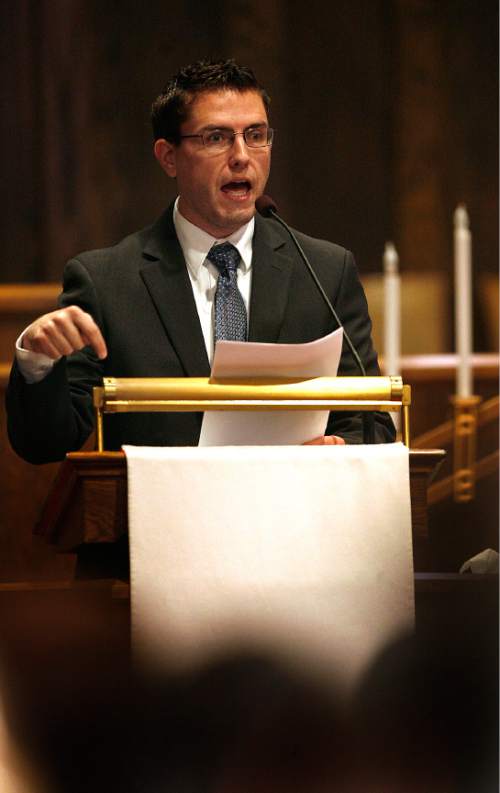This is an archived article that was published on sltrib.com in 2015, and information in the article may be outdated. It is provided only for personal research purposes and may not be reprinted.
A Mormon couple in a mixed-orientation marriage are objecting to their inclusion in a U.S. Supreme Court case filing because it argues that legalized gay marriage would demean the marriages of couples like themselves.
Josh and Lolly Weed's names and statements are referenced in a "friend of the court" brief ahead of the April 28 arguments in a consolidated 6th Circuit Court of Appeals case, which many expect will legalize gay marriage nationwide.
The brief was filed April 3 by American Fork attorney Darrin Johns on behalf of couples in mixed-orientation marriages — unions in which one partner is gay and the other is not — who oppose marriage equality.
The Weeds told The Salt Lake Tribune on Tuesday they didn't consent to be included in the filing, nor do they share its point of view.
Among the filing's arguments: Constitutionally mandated same-sex marriages can exist only by "erasing, marginalizing and demeaning the same-sex attracted who live in man-woman marriages" and would send a "harmful message that it is impossible, unnatural and dangerous for the same-sex attracted to marry members of the opposite sex."
"What does that have to do with us at all?" asked Josh Weed, an openly gay man who has been married to a woman for 12 years. "I feel no devaluation of my marriage status by having marriage equality."
The Weeds, of Washington state, became the public face of Mormon mixed-orientation marriage in 2012, when they posted their story on Josh's blog, joshweed.com, which garnered thousands of Web hits and national media attention. They do not advocate mixed-orientation marriages for others.
"My wife and I support marriage equality," Josh Weed said. "That is sacrosanct to us and important to us because we know many wonderful people who are hurt by the current state of affairs. To have this amicus brief out with our names associated with it is very hurtful."
The Weeds are far from alone in their concerns. An Internet post about the brief's arguments sparked a frenzy of criticism on Mormon-themed Facebook pages, which provide support or resources for gay or transgender Latter-day Saints and their families, including Mormons Building Bridges, Mormon Stories and Mama Dragons.
The brief includes quoted statements and references to online video interviews from nearly 20 individuals and couples about the joys and challenges of their relationships and their reasons for choosing mixed-orientation marriages.
All but one appear to be Mormons with ties to North Star, a support group and resource for mixed-orientation Latter-day Saints. Many have posted videos about their relationships with the related LDS Voice(s) of Hope online video project. A few also appeared on The Learning Channel's program "My Husband's Not Gay."
Doug Mainwaring, of Massachusetts, is the lone Catholic quoted in the document and drove what he called the "grass-roots" effort to gather supporters to sign on to the brief.
"There's been a message delivered loud and clear that if you are same-sex attracted, there's only one thing you can do, which is make the declaration that you are gay and make that the foundation of your identity," said Mainwaring, who will soon mark the 30th year of his own mixed-orientation marriage. "There are a lot of us that know that's not true."
An activist who helped found the National Capital Tea Party Patriots, Mainwaring said he felt so strongly about the importance of marriage between men and women that he reached out to individuals he knew through the Voice(s) of Hope project in hopes of taking their shared message to the Supreme Court. It's there, he said, that he found the individuals who signed on to the brief.
Although the group includes just 10 couples and three individuals, Mainwaring said he believes they represent many others — "possibly hundreds of thousands or perhaps far more" — who share their point of view, but don't feel comfortable speaking out.
Statements from the Weeds and a handful of other couples and individuals were gathered from Internet posts or other sources that were in the public domain and can be used under the legal doctrine of "fair use" when properly attributed.
For their part, the Weeds, who are expecting their fourth child in May, say they wish they had been asked whether they wanted to be included in Mainwaring's effort and believe they've been misrepresented. Josh Weed said an email he received days ago said that a mixed-orientation marriage brief might be in the works, but he didn't realize its implications.
"I wish there had not been assumptions made about my position," Josh said. "I wish I'd had the opportunity to say 'Please don't' and 'I disagree.' "
Lolly Weed adds that she's not sure whether the views expressed in the brief are providing any notable contribution to the discussion of same-sex unions.
Her marriage to Josh, she said, could always take place, with or without the blessing of her state or the U.S. Supreme Court.
"I feel like it's taking away from the real issue, which is the validity of marriage equality," she said. "I don't feel like our marriage really has a place in that fight."
The case pending before the U.S. Supreme Court considers lower-court rulings from Kentucky, Michigan, Ohio and Tennessee and asks two questions:
Whether the 14th Amendment requires a state to license marriages between individuals of the same sex and whether states are required to recognize same-sex marriages performed and legal in other states. A ruling is expected in June.



